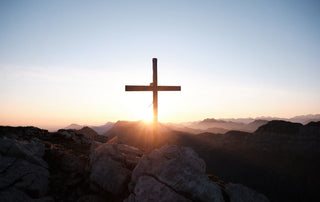Tomorrow is Ash Wednesday, the start of the forty-day period that leads to Easter. Ash Wednesday takes its name from the way that, for over a thousand years, many believers have chosen to have their foreheads marked with a small amount of ash, perhaps in a cross, as a sign of their commitment to keeping Lent. That grey daub can lead to humorous exchanges when those unaware of either the date or the practice will point out the dirt on the forehead and even seek to wipe it away with a tissue. Well, if that gives you an opportunity to talk about Jesus . . .
Let me suggest that Ash Wednesday speaks to us about three things.
First, Ash Wednesday is a reminder of the fragility of our lives. The recent fires in California have highlighted how so much that is beautiful and imposing can, in minutes, be turned into worthless grey ash. In most Ash Wednesday church services there will be a reference to God’s solemn words to Adam after he and Eve had rebelled, ‘You [will] return to the ground, since from it you were taken; for dust you are and to dust you will return’ (Genesis 3:19 NIV). Throughout the Bible, dust and ashes are symbolic of nothingness and destruction. This is echoed in those familiar words ‘ashes to ashes, dust to dust’ in the burial service of the Book of Common Prayer.
Although modern culture prefers to either ignore death, trivialise it or hold out the hope that ‘science will fix it’, it is an inescapable reality for us all. However fit, young or rich we are, our life has an expiry date.
Above the frantic noise of modern life, Ash Wednesday reminds us that, ultimately, we are all dust. In doing so, Ash Wednesday points to the urgent need for us to put ourselves right with Jesus while it is possible. There is a life beyond this life and only Christ offers it.
Think of the many New Testament verses, particularly those in John’s gospel, such as John 3:16; 5:24 and 10:27-28. Romans 6:23 is a good summary of what the gospel offers: ‘For the wages of sin is death, but the gift of God is eternal life in Christ Jesus our Lord’ (NIV).
Second, Ash Wednesday is a reminder of the failure of our lives. That life is limited is bad, but far worse is the news that, as rebels against God, we must face his judgement. Whatever we have achieved in this life – honour, riches or power – we are all ultimately those who are sinners.
We need to repent, and, in the Bible, ashes are frequently symbols of grief, remorse and repentance. So Job, ending his long struggle with God over his suffering, says, ‘Therefore I despise myself and repent in dust and ashes’ (Job 42:6 NIV). Daniel pleads to God with ashes (Daniel 9:3-5) and the people of Nineveh use ashes as a sign of their repentance (Jonah 3:6). Jesus himself mentioned towns that would have ‘repented long ago in sackcloth and ashes’ had they witnessed his miracles (Matthew 11:21 NIV). Ash Wednesday is a stark reminder that we all stand under God’s judgement and are guilty.
Yet Ash Wednesday is not just bad news; it is a reminder of the possibility of a glorious future for our lives. Ash Wednesday is not a ‘stand-alone’ episode in the Bible; it is the start of the journey that leads through Lent to the cross and the resurrection.
One great Bible passage to do with ashes is found in Isaiah 61:1-3, and it has a special significance because we read that Jesus claimed he himself fulfilled it (Luke 4:14-30). It begins, ‘The Spirit of the Sovereign Lord is on me, because the Lord has anointed me to proclaim good news to the poor. He has sent me to bind up the broken-hearted, to proclaim freedom for the captives and release from darkness for the prisoners, to proclaim the year of the Lord’s favour . . . to comfort all who mourn, and provide for those who grieve in Zion – to bestow on them a crown of beauty instead of ashes’ (NIV).
You may be someone who looks at your life and all you have done and can see nothing but dry, grey ashes, but with Jesus Christ, one day all that will be wonderfully transformed into a glorious crown of beauty. Rejoice!
J.John
Reverend Canon




